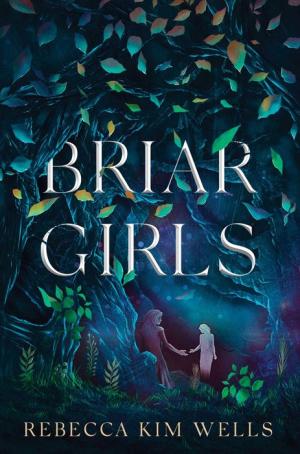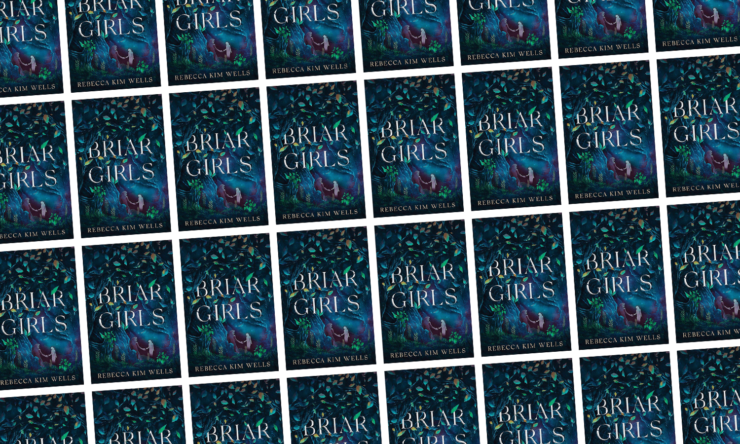Lena has always been alone. She has to be. The merest touch of her bare skin condemns any person to a violent, immediate death. Her parents bargained with a witch to save her mother’s life before she was born, promising their child to her in return. When Lena was born, they fled—and the witch cursed her. It’s almost all right for a while—until Lena has a terrible accident, and her mother abandons them. She and her father are forced to flee to a village on the edge of a dangerous, enchanted forest called the Silence, within which lies a city filled with magic.
This, at least, is the story Lena’s been told.
Everything changes when she meets Miranda. Miranda’s on a quest to wake a sleeping princess in the heart of the Silence, in the hopes of freeing the Gather from its corrupt ruler who uses blood magic as a means of brutal control. Her father warns Lena against Miranda’s intentions, but Miranda is the first person Lena’s met who seems to truly understand how lonely she is. Who wants to show her the world, not protect her from it. For the first time in her isolated, sheltered life, Lena is tasked with figuring out who she can trust, a skill at which she has almost no practice. Especially as she realizes that the curse that’s plagued her since she was born is also a dangerous weapon. And as she realizes her interest in the volatile, mysterious Miranda may not be purely intellectual. As Lena runs away from everything she’s ever known to follow Miranda on her quest, she wakes up to the world around her, all while trying to discover the dark truth behind her own curse.
Buy the Book


Briar Girls
Rebecca Kim Wells’ Briar Girls is a strong, subversive, sex-positive bisexual fairytale that satisfyingly blurs the genre’s more conventional boundaries between good and evil. Fairytales are often bloody, but they’re usually sanitized out of necessity, the violence flattening against the backdrop of the Happily Ever After—not here, though. Briar Girls not only delves into the brutality of Lena’s curse and the devastation of blood magic, it gives due weight to a lineage of magical sacrifice and forgiveness. Though there are touchpoints of Sleeping Beauty and a bit of Rapunzel, this is really its own fairytale, rooted in Lena’s shifting understanding of her own power. With Briar Girls, Wells wakes up Sleeping Beauty. She grants the sequestered princess agency and lineage. There’s no destined prince, no envy over beauty, only impossible circumstances and the terrible choices a person has to make to protect the ones they love.
The entirety of this book is deliciously morally gray. Lena starts out so innocent and evolves into more of an anti-heroine. Her power is simultaneously a curse and a protection—so much about Lena is the tension of this duality. She grows up thinking her parents are good and the witch who cursed her is evil, but the circumstances of her world mean it’s not so simple. It’s so fun to watch Lena’s relationship to her power, her body, and her desires change and grow as she learns about herself and the world around her. She ends up in a wildly different place from where she began, and it’s a satisfying, intriguing journey, especially because along it, no one is truly who they seem.
Briar Girls is a lush, twisty fantasy. A bit more worldbuilding might’ve made some of the twists land harder for me, but it’s still deeply atmospheric and propulsive. I also could’ve used more swooniness in the love triangle—I understood why Lena was attracted to each of them, but I wanted more of a sense of why they were attracted to her. There was potential for a deeper exploration of Lena’s relationship to trust for both of them, especially after hers is betrayed.
However, these are relatively minor—like with the worldbuilding, my only real critique is “I liked this so much, I could’ve used even more of it.” Overall, I adore the romance in this book. It feels real, complicated and fitting in the way the love interests pull Lena in multiple, surprising directions. Wells delivers sex positive queerness and bisexuality, touch-starved sex, and a wonderfully fulfilling sort of love triangle—one built not only on ache, but on exploration and self-actualization, with all parties understanding. It works so well in part because Lena is so lonely. It’s a central part of her curse and her character, so it’s deeply cathartic to see her get to be adored and wanted in this way. Let bisexuals explore! People have sex or don’t have sex for a variety of reasons, and I love that that gets explored on the page here. I found this kind of queer messiness and joy within a fairytale thoroughly refreshing. I also really appreciate the inclusion of normalized trans side characters.
Nuanced, innovative, and immersive, Briar Girls will bewitch queer fantasy fans.
Briar Girls is available from Simon & Schuster Books for Young Readers.
Maya Gittelman is a queer Fil-Am and Jewish writer and poet. They have a short story forthcoming in the YA anthology Night of the Living Queers (Wednesday Books, 2023). She works in independent publishing, and is currently at work on a novel. Find them on Twitter (@mayagittelman) or Instagram (@bookshelfbymaya).










